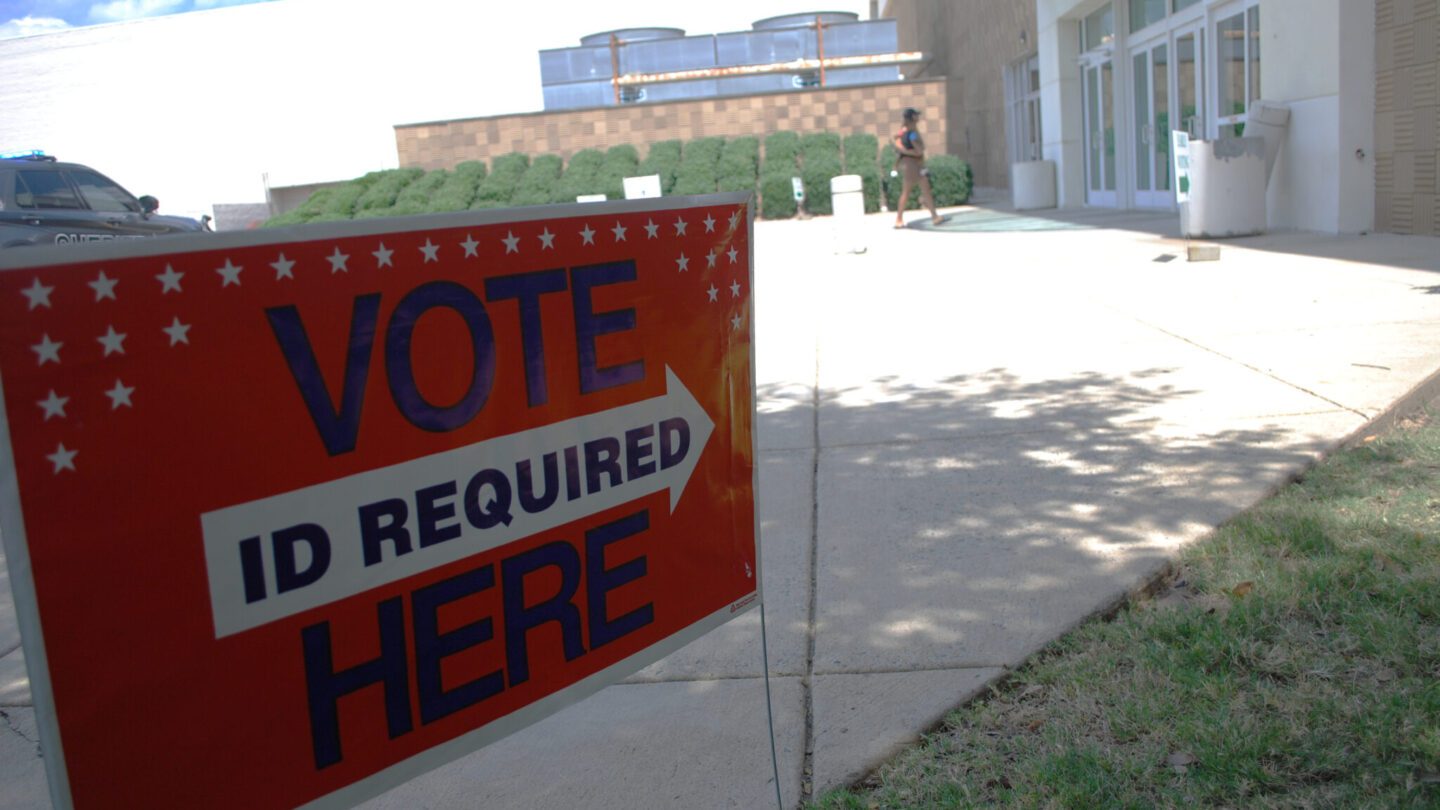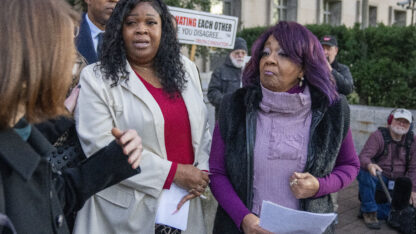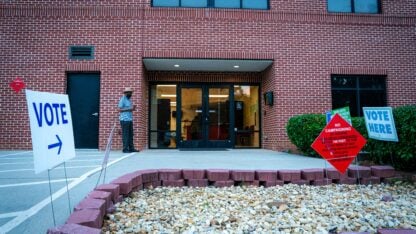Georgians are logging into hot new apps intended to help find people in your area, but they’re not going to help you spark romance, hitch a ride, or order dinner.
The age of technologically assisted mass voter challenges is well upon us, and these tools could have a major impact on the 2024 elections. Fans of the apps say they will help prevent cheating by removing invalid voters from the rolls, making it harder for bad actors to cast fake votes. Opponents say all they will do is insert chaos into the process.
“What our office is concerned about is that valid voters who are entitled to be registered might be removed from voter rolls erroneously, and that might impede someone’s right to vote,” said Mike Hassinger, spokesman for Georgia Secretary of State Brad Raffensperger’s office. “That’s the holy grail of secretaries of state – every valid voter needs to be able to have the opportunity to vote. And while we appreciate the concerns of outside groups about the integrity of our voter rolls, we are diligent in maintaining their accuracy.”
Hassinger said the data available to the state is far more accurate and complete than what those outside groups can access.
“It’s not like, you know, Coke versus Pepsi versus Dr. Pepper,” Hassinger said. “These are not like off-the-shelf software programs that we have. We have procedures, practices, systems and routine checks that are already better than anything EagleAI could provide.”
EagleAI
EagleAI, a Georgia-based platform for creating mass voter challenges, has become one of the best-known avenues for would-be ballot disputers.
Voters in Georgia have already been using it to challenge the eligibility of large numbers of registered voters, including in Bibb County, where the board of elections Monday accepted 45 challenges from Bibb GOP chair David Sumrall but rejected 198 others, according to the Macon Telegraph.
The 45 voters, who were registered at post office addresses, will need to confirm their address or they could be removed from the voter roll after two federal election cycles.
EagleAI developer John W. “Rick” Richards Jr. could not be reached for comment. But in a collection of Zoom calls obtained and edited by the nonprofit investigative watchdog group Documented, Richards, sitting in front of a backdrop of the bridge from the USS Enterprise from Star Trek: The Next Generation, said the program’s target audiences include individuals who mistrust election results and want to challenge voters and county governments struggling to deal with the extra work caused by those individuals.
“We have found that some of these counties in Georgia don’t like all of these challenges and they are looking for a solution that they can hire and outsource their headache,” Richards said. “So we’d rather keep the challenges going, they have ten days to respond in Georgia, so we keep the challenges going, keep the heat up, they know that they can’t respond, so they’re out looking for solutions, which, we could be the solution.”
Despite the name, EagleAI does not appear to use artificial intelligence, rather it compiles data from multiple publicly available sources, including secretary of states’ offices and U.S. Postal Service change of address data. It allows users to quickly format this data into a form that can be presented to county election offices.
True the Vote’s IV3
A similar app, IV3, short for Independent Voter Validation and Verification, is a web-based application from Texas-based True the Vote that uses data from the U.S. Postal Service.
The website was registered on Nov. 15, 2020, in the aftermath of the election which former President Donald Trump and supporters falsely allege was stolen.
It is registered to True the Vote founder Catherine Engelbrecht, who did not respond to emailed requests for an interview. During a recent IV3 training session, Engelbrecht said the system will combat potential malfeasance.
“The lion’s share of the problems we have in our voter files are not caused by voters,” she said. “They are caused by lackadaisical maintenance standards, antiquated processes for maintaining your data, and – I’ll just (say), unsavory elements that are intentionally trying to exploit the weaknesses of the process, because the reality is, with this much slop in the system, it is very easy to figure out where an active but otherwise dormant registration exists and cast it. With this crazy press towards the mass mail out of ballots, it’s a very easy thing to conceive how this could be used to engineer, you know, a certain level of chaos in the turnout.”
Georgia does not mail out ballots en masse.
Before logging in, users must submit a photo of their drivers license for approval.
Once they get in, they are presented with several options for challenging their neighbors’ right to vote.
The first is for voters who have filed for a change of address out of their county. Clicking that option will serve up the name of a person registered in the user’s county who has filed for a change of address with the post office.
The other main option shows a list of voters registered at non-standard addresses, including those the post office has labeled invalid, commercial, vacant, mailing centers or P.O. boxes. Some of the commercial addresses flagged in one north metro Atlanta county include extended stay hotels, homes for children and teens in foster care, senior or assisted living homes and a college campus.
For each person’s name, users can add it to their list of challenges, decide not to challenge and leave a message for future users about why they made that decision, or skip to the next name. Once a user is done, they can export their challenges to a spreadsheet along with a template cover letter to send to their local election office.
Engelbrecht told trainees there are more than 25 million potentially ineligible records nationwide, and True the Vote’s data suggests there are nearly 700,000 in Georgia, including 439,000 who have moved and 122,000 registered at invalid addresses.
Not all of them are likely to be challenged. Engelbrecht told trainees to quickly research each potential challenge, come to a decision and move on to the next one.
“Don’t feel like you’ve got to – unless this is really just kind of your thing – don’t feel like you have to fall to the bottom of the rabbit hole with every single file,” she said. “Just do what you can and keep moving because the goal here is to get the most obvious potential offenders – potential problems – submitted as quickly as possible so that your county can react, that your county can do whatever they’re going to do.”
True the Vote worked to challenge hundreds of thousands of votes ahead of the U.S. Senate runoffs in Georgia following the 2020 election. In January, a federal judge ruled that that campaign did not violate the Voting Rights Act, but District Court Judge Steve C. Jones found that True the Vote’s list “utterly lacked reliability. Indeed, it verges on recklessness.”
The politics
Democrats and voting rights activists say a certain number of inactive or ineligible voters on the rolls is normal as people move, change their names or die. States need to balance cleaning out outdated information with making sure they do not prevent people from exercising their right to vote, and flooding county election offices with challenges could be detrimental to the system, said state Rep. Saira Draper, an Atlanta Democrat, attorney and voting rights expert.
“I think we’re going to see hundreds of thousands of voter challenges in August and September,” she said. “That’s going to have a couple repercussions. One, it’s going to successfully remove people from the rolls, whether that’s accurate or not, I don’t know. But I think county election offices are going to feel like their hands are tied, given the new legislation, and they’re going to vote to remove people from the rolls based on flimsy evidence, whereas prior to the legislation that passed this year, they would have not voted to remove those same people from roles.”
Draper was referring to Senate Bill 189, which became law July 1 after passing the Legislature on party lines in the spring. The legislation bolsters 2021’s controversial omnibus election bill, Senate Bill 202, which, among other provisions, further spelled out that citizens can challenge as many voters in their county as they wish.
Draper said she’s also worried about people who are eligible to vote but may be in a temporary living position opting not to cast a ballot after being notified that their registration has been challenged.
“To me, this is an intimidation tactic,” she said. “If they go and challenge these people who are at extended stay hotels or otherwise in non-fixed housing and these folks are going to receive a letter telling them that their voter registration status has been challenged, it’s a way of keeping people who are living on the margins out of our voting process.”
But Senate Majority Leader Steve Gooch credited SB 189 for providing more clarity about voter eligibility challenges as part of the ongoing efforts to keep voter rolls accurate.
“Our number one goal is to restore the confidence of voters of this state that our system is fair,” Gooch said during a June press conference at the state Capitol hosted by the Center for Election Integrity at the American First Policy Institute, a think-tank founded in 2021 by former Trump administration officials and other supporters.
Gooch said SB 189 establishes the types of evidence needed to challenge a voter’s status while building upon the intent of 2021’s voting law overhaul in restoring confidence in Georgia’s election system.
Under the new law, there is enough probable cause to challenge an elector who is dead, registers to vote in more than one jurisdiction, registers with a non-residential address, or has a property tax homestead exemption in a different jurisdiction than where they vote.
“These are things that have come before us for the last three years with a lot of questions about how does this process work? Where is the transparency to allow citizens to challenge the qualifications and the eligibility of an elector registered here in the state?” the Dahlonega Republican said.
“Those are some of the belts and suspenders that we put into SB 189 to ensure that transparency is there and accountability is a part of it as well,” Gooch said.
During a May tour of the Georgia Democratic Voter Protection Hotline office, Democratic Party Executive Director Tolulope Kevin Olasanoye told reporters his party is gearing up to respond to mass challenges.
“What I think this mass voter challenge piece creates is, even if we get all that stuff right on the front end, on the back end, is chaos,” he said. “Whose votes are going to be challenged and under what circumstances? Where are those voters going to be challenged? (Those) are all the kinds of things you can’t really anticipate, so you have to plan for it all. That’s why we’re making sure that our voter protection program is robust enough, and also nimble enough to be able to react in real time to things we’ll see.”
“I often say to our team that you want to always be able to play offense on the things you can anticipate and only be reactive to the things that you never saw coming,” Olasanoye added. “This bill creates an environment where we’re all going to be reacting to stuff in real time because nobody has ever worked in this sort of environment.”
This story was provided by WABE content partner Georgia Recorder.









